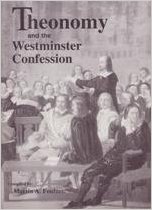To [Israel] also, as a body politic, he gave sundry judicial laws, which expired together with the state of that people; not obliging any other now, further than the general equity thereof may require. What "the general equity thereof may require," of course, is something that needs to be understood in light of the historical, grammatical context in which the statement was written. If the authors of the Westminster Standards truly believed that the penal sanctions of the civil aspect of the Mosaic Law had no abiding validity, then understood in today's English it would seem this statement invariably settles the matter. But did they actually believe that? And if not, what is meant by that statement? Dr. Kenneth L. Gentry Jr. gives some very sound arguments for what is meant by that statement in his article, Theonomic Ethics and the Westminster Confession. As for what the authors, influencers, and subscribers of the Westminster Standards believed in regard to the penal sanctions of the Old Testament as being completely abrogated, that is very clearly answered in this book. Martin A. Foulner quotes from over forty different authors, from their own writings - all attesting to the theonomic principles of civil justice - that God is both Lord over His church and Lord over the state, and that it is His Law that is the standard of civil justice. This book is not going to give you reference to those who were opposed to this idea at the time of the writing and publication of the Westminster Standards. However, what this book sets out to do, it does with finality. This book shows from primary sources that the principle of theonomic ethics is not something "new" but a school of thought that has a deep and rich heritage in the Reformed and Puritan faith. To give you an idea of how widely articulated the principle was, here is a list of the men the author shows (from their own primary sources) as having a similar attitude toward the Law of Moses as that advocated by theonomists today. Actual members of the Assembly: *George Gillespie (1613-1648) *Samuel Rutherford (1600-1661) *Jeremiah Burroughs (1599-1646) *Hebert Palmer (1601-1647) *William Reyner (d. 1666) *Richard Vines (1600-1655) *Thomas Hodges (d. 1672) *Philip Nye (1596-1672) Other influcencers or otherwise subscribers to the published confession: David Dickson (1538-1663) James Fergusson (1621-1667) James Durham (1622-1658) George Hutcheson (1626-1674) John Brown of Wamphray (c. 1610-1679) Nathanial Hardy (1618-1670) Thomas Gilbert (1610-1673) Alexander Shields (1660-1700) William Jenkyn (1612-1685) John Mayor (1583-1664) James Usher (1581-1656) John Knox (1514-1572) Martin Luther (1483-1546) Martin Bucer (1491-1551) John Calvin (1509-1564) Heinrich Bullinger (1504-1575) Bishop John Hooper (d. 1555) Hugh Latimer (1485-1555) Thomas Becon (1512-1567) Thomas Cartwright (1535-1603) Archbishop John Whitgift (1530-1604) William Perkins (1558-1602) Henry Barrow (d. 1593) Philip Stubbs (1555-1610?) Johannes Wollebius (1586-1629) John Owen (1616-1683) John Cotton (1548-1652) Thomas Shepard (1605-1649) John Eliot (1604-1690) Samuel Willard (1640-1707) Samuel Sewell (1652-1730) Thomas Ridgely (c. 1667-1734) Thomas Scott (1747-1821) James H. Thornwell (1812-1862) Robert Dabney (1820-1898) Documents with Theonomic Principles: A Solemn Testimony Against Toleration, etc. By the Commissioners of the General Assembly 1649 General Assembly of the Church of Scotland Parliament of Scotland Cromwell's Rump Parliament New Haven Colony (1641) Massachusetts Bay Colony Code (1648) --- While the exact way in which the civil portions of the Law of Moses is to be interpreted and the exact way in which civil justice is to be administered had variance between several of these men (just as it does with today's theonomists), the principle still remained the same. Unless God Himself reveals a new standard of civil justice, then who is man to alter what God has already laid down as a holy, righteous, and good command (Rom. 7:12)? Who is man to alter what God has delivered as a just law (Deut. 4:8; Heb. 2:2)? Theonomy is indeed not a new principle or school of thought. It has a very deep and rich heritage in the Reformed faith, as can be traced to the members, influencers, and subscribers of the Westminster Standards. I can only end this review with an unwavering agreement with the endorsement on its back cover: Does the Westminster Confession teach Theonomy? May God bless you in your studies! "For from him and through him and to him are all things. To him be glory forever. Amen" (Rom. 11:36). (1) For a Biblical or Theological statement or defense of the orthodoxy of the theonomic perspective, I recommend the following:
Theonomy in Christian Ethics, Greg L. Bahnsen By This Standard: The Authority of God's Law for Today, Greg L. Bahnsen No Other Standard: Theonomy and Its Critics, Greg L. Bahnsen God and Government, Gary DeMar Theonomy: An Informed Response, ed. Gary North Institutes of Biblical Law, R. J. Rushdoony God is Just: A Defense of the Old Testament Civil Laws, Steve Halbrook |
Categories
All
|
